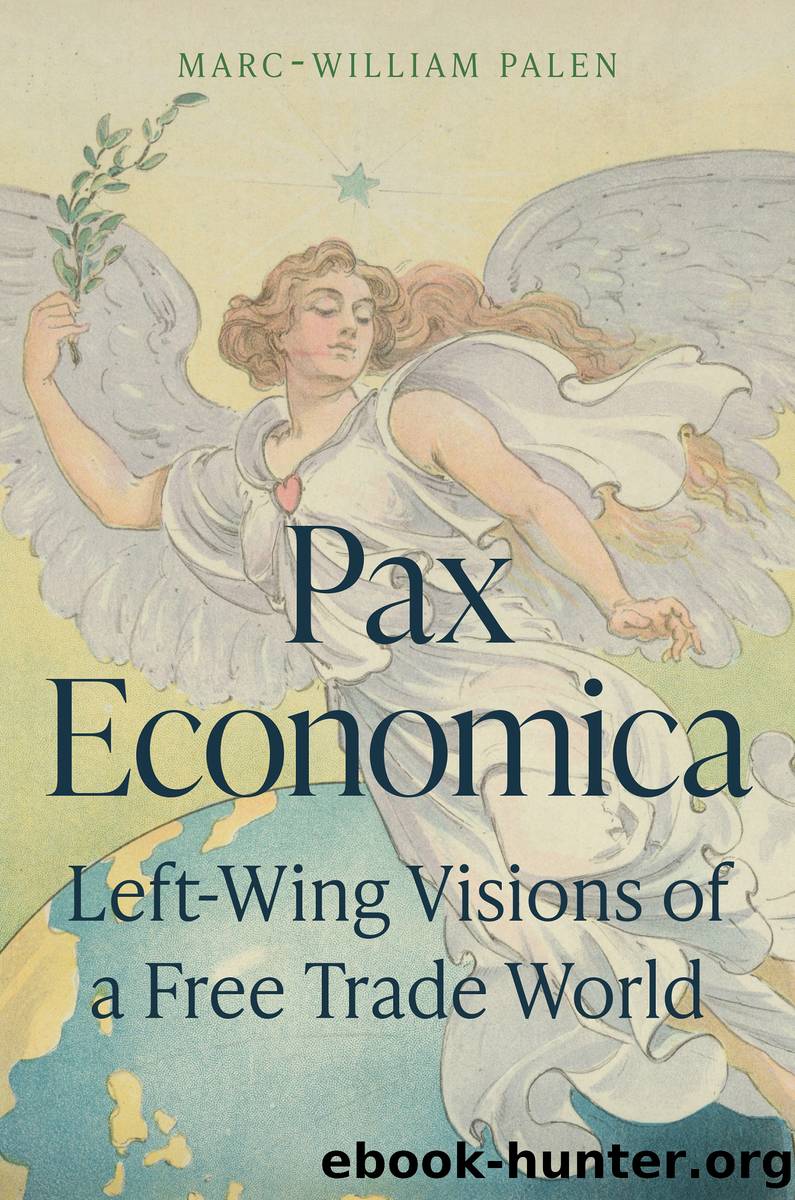Pax Economica by Marc-William Palen;

Author:Marc-William Palen;
Language: eng
Format: epub
Publisher: Princeton University Press
Published: 2023-11-03T00:00:00+00:00
In 1920s New York City, as Michael Thompson illustrates, liberal Protestantism was becoming more closely aligned with left-wing radical anti-imperialism thanks in no small part to Kirby Page and Sherwood Eddy.77 Like many of the nationâs liberal Protestants, the FCC, the CPU, and YMCA leadership, including Page and Eddy, had become caught up in the patriotic fervour of the First World War. They now sought to do penance. Democratic president Woodrow Wilson, an avowed disciple of Manchester liberalism and son of the famous Presbyterian theologian Joseph Ruggles Wilson Sr., in turn breathed new life into their progressive millenarian mission of creating a peaceful and interdependent world order in the wake of his Fourteen Points speech in 1918.78 Page, working alongside Eddy, was instrumental in connecting liberal organizations such as the YMCA and the FCC with the Quakersâ more radical American FOR and the Socialist Party of America (SPA). From YMCA headquarters in New York City, Page and Eddy oversaw mass pamphleteering campaigns on behalf of Russian recognition and Filipino independence. In The Abolition of War (1924), Page laid the lionâs share of the blame for colonialism and war upon the âeconomic imperialismâ of the âindustrially advanced nations [â¦] securing control of the raw materials [â¦] and markets in backward nationsâ since the 1870s. He criticized economic blockades for being âas deadly as warâ and harmful to neutrals as well as belligerents. He also noted with approval that the League of Nations was moving away from the economic boycott as a âmeans of enforcing its decisionsâ.79
In Imperialism and Nationalism (1925), Page showed that he well understood imperialismâs formal political and informal economic manifestations. The industrializing powers were ratcheting up their economic nationalist policies and their imperial search for raw materials and new outlets for surplus capital. Turkeyâs economic woes, for example, had only been âaggravated and intensified by extreme nationalismâ by way of âdrastic tariff regulationsâ and âheavy taxationâ. He also took âdollar diplomacyâ in Latin Americaâa US policy of providing loans with coercive strings attachedâto task. In the case of El Salvador, he criticized a US loan of $6 million because it was to be repaid principally from customs duties, making El Salvadorâs tariffs a permanent fixture. Drawing directly upon British âNew Liberalâ J. A. Hobsonâs Imperialism: A Study (1902), Page concluded that âinternational commerce and international finance [â¦] desperately need regulationâ at the international level, and that âthe whole question of the distribution of the raw materials of the earth deserves serious and immediate attention [â¦] as does also the extraordinarily vital question of tariffsâ. âThe old theory of the absolute sovereignty of the nation needs to be abandonedâ, he continued, to establish âpermanent peace and justice throughout the earthâ.80 The following year, Page once again referenced Hobson alongside the New Testament to lay out his vision for a âChristian Economic Orderâ centred upon social justice, industrial democracy, equality for women, and universal brotherhood. Page had also recently created the Fellowship for a Christian Social Order, which tarred racism, autocracy, and âmonopoly of natural resources for private gainâ as âunchristianâ.
Download
This site does not store any files on its server. We only index and link to content provided by other sites. Please contact the content providers to delete copyright contents if any and email us, we'll remove relevant links or contents immediately.
International Integration of the Brazilian Economy by Elias C. Grivoyannis(74542)
The Radium Girls by Kate Moore(11616)
Turbulence by E. J. Noyes(7695)
Nudge - Improving Decisions about Health, Wealth, and Happiness by Thaler Sunstein(7238)
The Black Swan by Nassim Nicholas Taleb(6761)
Rich Dad Poor Dad by Robert T. Kiyosaki(6174)
Pioneering Portfolio Management by David F. Swensen(6078)
Man-made Catastrophes and Risk Information Concealment by Dmitry Chernov & Didier Sornette(5644)
Zero to One by Peter Thiel(5487)
Secrecy World by Jake Bernstein(4387)
Millionaire: The Philanderer, Gambler, and Duelist Who Invented Modern Finance by Janet Gleeson(4089)
The Age of Surveillance Capitalism by Shoshana Zuboff(3981)
Skin in the Game by Nassim Nicholas Taleb(3965)
The Money Culture by Michael Lewis(3843)
Bullshit Jobs by David Graeber(3826)
Skin in the Game: Hidden Asymmetries in Daily Life by Nassim Nicholas Taleb(3720)
The Dhandho Investor by Mohnish Pabrai(3560)
The Wisdom of Finance by Mihir Desai(3523)
Blockchain Basics by Daniel Drescher(3326)
